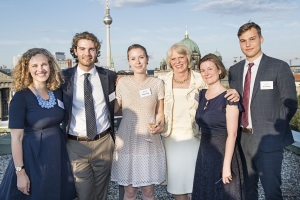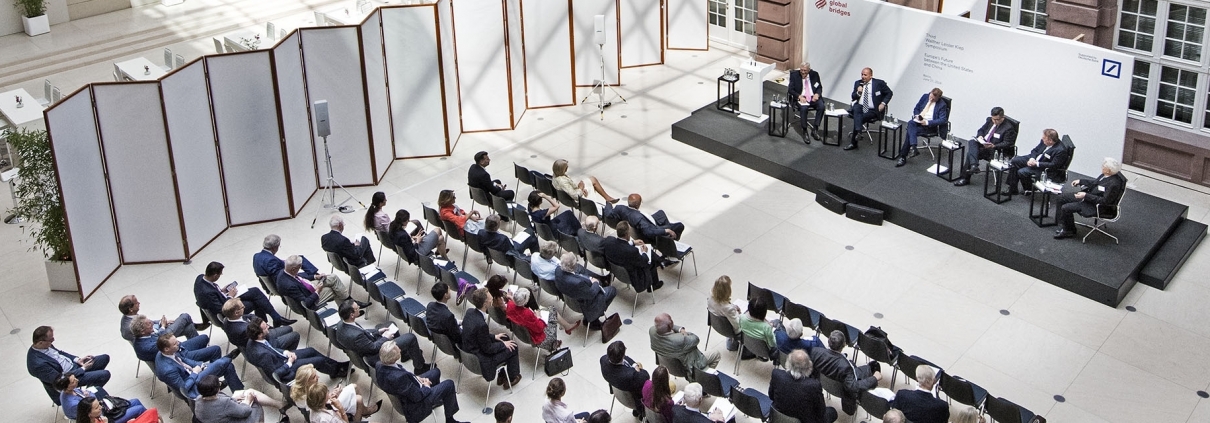III. Walther Leisler Kiep Symposium 2018
Europe’s Future between the United States and China
Berlin, Germany
June 26 and 27, 2018
Unter dem Thema „Europe‘s Future between the United States and China“ diskutierten hochrangige Vertreter aus Wirtschaft, Wissenschaft, Politik und Medien anlässlich des diesjährigen III. Walther Leisler Kiep Symposiums über die Zukunft Europas zwischen den Vereinigten Staaten und China. Dank der erstklassigen Gastredner, dem wunderschönen Eröffnungsabend über den Dächern Berlins im Atrium der Deutschen Bank und dem sommerlichen Ausklang auf der Dachterrasse unseres Mitglieds Dr. Kurt Schwarz war das Symposium auch in diesem Jahr wieder ein großer Erfolg.
Den thematischen Einstieg bot Richard R. Burt, Botschafter der Vereinigten Staaten in Deutschland a.D., mit einem Rückblick auf die Entwicklung der transatlantischen Beziehungen seit dem Zweiten Weltkrieg.
Zum ausführlichen Bericht von Dr. Rudolf Adam bitte hier klicken
Report by Rudolf G. Adam
The Third Walther Leisler Kiep Symposium began in the evening of June 26th with a keynote address by Richard Burt: “Are we Approaching the End of the Atlantic Partnership?”
Richard Burt looked back on how transatlantic relations evolved after the Second World War: James F. Byrnes’ famous Stuttgart speech of hope in which he assured Germans that the USA was supporting a recovery of an autonomous Germany (Stuttgart, September 26, 1946: “The American people want to help the German people win their way back to an honorable place among the free and peace-loving nations of the world.”); the airlift 1948; Germany joining NATO in 1955; John F. Kennedy’s equally famous words: “Ich bin ein Berliner!” in 1961. The USA and Germany had their differences in the 70s and 80s over Germany’s “Ostpolitik,” the pipelines that transported Soviet oil to Western Europe, the “Nachrüstung,” the “Hähnchenkrieg,” star wars and a few other questions. However we listened to each other, we respected each other, and thus found mutually acceptable solutions in a friendly spirit of compromise. Ronald Reagan uttered his almost prophetic words in 1987: “Mr. Gorbachev, tear down this wall!” In 1993, his successor George H. W. Bush pronounced Germany and America “partners in leadership.”
It was more than trust and cooperation. It was mutual affection, common values and interests that kept this unique partnership alive and vital.
Today, most of this has gone. “America First” means that everything else is second – including the alliance. President Trump is not a fan of NATO nor of the EU. He has scolded both organisations collectively and most of their members individually. President Trump has withdrawn unilaterally from the Trans-Pacific Partnership, from the Paris Climate Accords, and from the Iran-Deal (JCPOA). He has forced Canada and Mexico to renegotiate NAFTA, has brusquely cancelled his signature under the G7-conclusions of La Malbaie, and has gratuitously insulted the Canadian Prime Minister. He talks of trade wars and brags of winning them all.
After the departure of H.R. McMaster and Gary Cohn, there is little experience and less potential of rational analysis left in the White House. At the moment, it is impossible to identify a coherent line in Trump’s foreign policy. It seems impulsive, focused on the personality of the president and his public relations.
The US is needlessly and aimlessly involved in wars that have little or no bearing on its real interests. The invasion of Iraq in 2003 was a huge mistake (although John Bolton continues to praise it); in Afghanistan, US troops trudge on simply because no president wants to be the one accepting defeat; nobody knows which strategic aims the US is pursuing in Syria (if there are any at all); Libya has proved an unmitigated disaster.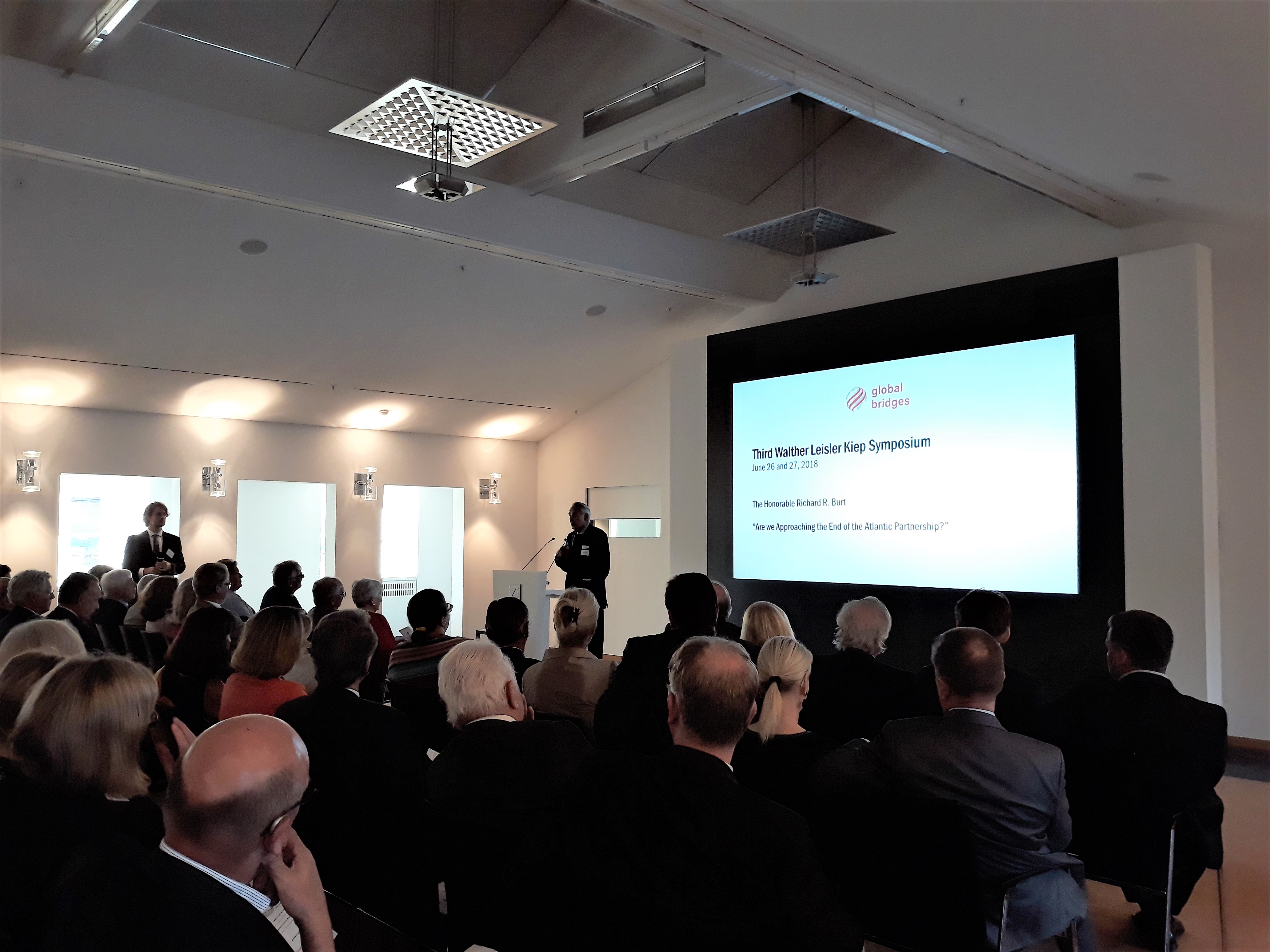
Trump’s policy towards Russia/Putin is inconsistent and incomprehensible. A forthcoming summit in Helsinki could follow the pattern of the Singapore meeting with Kim Jong-un: a media spectacle around Donald Trump. Singapore was extremely vague: no details, no timetable, no quid pro quo. By cancelling joint maneuvers with South Korea, Trump has strengthened Kim’s hand. In the end, that meeting may have encouraged rather than repressed proliferation.
In Helsinki, Trump could easily weaken the Western position vis-à-vis Russia by making unilateral concessions like over Crimea, Ukraine or cancelling joint NATO exercises in Eastern Europe. Sanctions will not have much of an effect. They are no substitute for real diplomacy, even less for a strategic policy. On balance, they may have strengthened Putin’s internal position and exacerbated anti-Western sentiments among the Russian population. Under Trump, we may lose whatever is left of the historic arms control projects of the 80s and 90s: INF, New START (runs out in 2021; a successor agreement would have to be negotiated during an electoral campaign). There are no initiatives to address new threats in digital or hybrid warfare.
Russia could prove to be Trump’s undoing, however. Robert Mueller will present his report in the fall of this year, shortly before the midterm elections. In all probability, it will contain some incriminating evidence. If the Democrats win a majority in the
House of Representatives (which seems likely), there will be initiatives to impeach the president. In 1974, the leaders of the Republican Party persuaded Nixon to resign. Trump will not resign. He will fight until the last moment. This could prove a nasty, brutish and chaotic second part of his presidency, with the USA largely paralyzed by internal struggles.
China’s inexorable rise provides the greatest challenge for US foreign policy. So far, the Trump administration vacillates between claiming particularly close relations with China’s president Xi Jinping, and confronting China’s trade policy.
Trump is not interested in Africa (what he has referred to as “shithole countries”). Europe will have to face the problems of that continent without the help of the USA.
The JCPOA with Iran was a great achievement, not perfect, but a solid building block for improved relations. Trump left it without any alternative (Plan B), thereby raising the spectre of a military confrontation that might well result in the break-up of the Atlantic Alliance
The speaker left Europe with three messages:
1. Stick up for your values and interests! Show the advantages of cooperation over confrontational policies!
2. Europe must strengthen its unity and its purpose of action. This presupposes that Germany and France work hand in glove!
3. Europe will have to carry more of the shared burden in terms of defence. The EU will have to reform to become more operative in security, and European nations must increase defence efforts and convincingly move towards the 2 % goal.
The speaker closed on a somber note: the Atlantic community might be heading for “Dark Ages.” As in that distant past it might be essential to keep the lights burning and the flames alive.
Discussion
Trump is hurting his own political base by imposing tariffs, but people keep cheering for him. When the management of Harley Davidson announced that some production might have to be transferred to third countries because of these tariffs, workers protested and demonstrated for Trump. The Republican Party used to be an urban/suburban middle class party. It is now a party of the working class and of the precariat.
The party has been eviscerated, prominent politicians have been forced to accept decisions they spent years of their careers to fight: Paul Ryan was one of the most committed protagonists against excessive government spending, yet he carried the last tax reform that is bound to increase the government’s deficit substantially. Trump’s supporters do not benefit from his reforms: Tax reform favours top 1 % of incomes, while Obama Care provided affordable health services to lower income groups. Yet it is these segments of society that keep cheering for Trump. He also draws support from evangelical
Christians who do not take exception at the obvious lying, the misogynist remarks, or the permanent polemical aggressiveness. Voting for Trump means voting against an intellectual and financial elite that has lost touch and is seen to have less and less in common with the majority of simple workers and toiling lower middle class families. The financial crisis of 2008 has rapidly deepened this chasm separating the moneyed, established elite from those ordinary folks that have to struggle to survive. The outcome of the next election will largely depend on whether the Democrats can present an electable candidate.
A second Bernie Sanders will deliver the White House to Trump again without much effort. At the moment, 27% of Republicans stick with Trump. In the background, a battle is raging between traditional/ moderate Republicans and Trumpists. Trump may be a maverick, but he is also a symptom for long-term trends in societal changes. The tide he rides has been surging for a long time and will persist long after he is gone.
The encouraging news: the US is not a large Trumpville! Checks and balances are still intact. California is following its own path of development that is increasingly diverging from the one pursued in Washington, DC. The same may be true of Texas, which is growing out of oil and could fall to the Democrats.
On June 27th the Symposium consisted of three sessions:
First Session
The Transatlantic Relationship: Trade Wars – A Strained Security Alliance?
Richard R. Burt
The transatlantic relationship is acquiring a counterweight in a Trans-Asian relationship: the EU, Great Britain and Kazakhstan will become stepping stones in those relations.
There is a crisis in globalisation. Economic global integration provokes political nationalist protests. There may be winners globally, there are undoubtedly losers locally. Rigid rationalism of financial calculations provokes a crisis in identity, solidarity and emotional reactions. Harley Davidson: economically rational and sound management decision rejected by workers who cheer for Trump. Did the management communicate well enough. Was the timing right?
Radical populism could trump rational economics. What do governments/what do managers have to do under such circumstances?
Three pertinent questions:
1. If there are losers, what can governments do to soften these losses or to compensate losers?
2. The USA is progressively isolating itself: America First will lead to America alone. Is there a way to trade around the USA? Given the mighty position of the Dollar and of American banks, there is hardly any international transaction that does not touch the USA somehow. But how does one react if the USA uses (abuses) this strategic position to slap sanctions on whomever does not toe the line prescribed in Washington?
3. Are sanctions a substitute for foreign policy? Do they enforce changes of behaviour? What impact do they have on Russian policy? Are they meant as retribution, as punishment, as admonition, as a moral warning, as a lever to enforce change? If they do not work, what instruments do we have left? They are part of soft power. If they fail, we will have to look for instruments of traditional hard power.
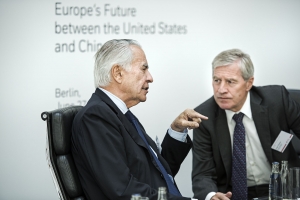 Trump is not only a bizarre individual. He signals tectonic change in society and attitudes that will outlast him and thus change the framework in which we have conducted policy since 1945.
Trump is not only a bizarre individual. He signals tectonic change in society and attitudes that will outlast him and thus change the framework in which we have conducted policy since 1945.
Do not fall into the trap of personalising politics! Trump is as much a symptom of long term societal changes as an individual maverick. The same applies to Orban, Kaczynski, Salvini – or Erdogan and Putin for that matter. Even if these politicians left office today, their countries would not revert instantly to the status quo ante. On the contrary: disturbing tendencies may change direction, but will probably continue with new faces.
The exaggerated importance attached to public personalities corresponds with an underestimation of the political influence of private personalities. Of the 100 greatest economic units globally, 51 are private corporations, only 49 are states. The political influence wielded by the Koch brothers, by Peter Thiel, or George Soros may easily exceed that of many elected politicians. This situation is the consequence of a seriously flawed decision of the Supreme Court.
We have our own oligarchs in the West. Putin made them stay out of politics. Maybe we still have to do such a deal with our Western oligarchs.
Baroness Pauline Neville-Jones
Sanctions work sometimes, but they take a long time. If you want to avoid military conflict, there is little else that you have left. Globalisation has made it easier to worm your way around them. COCOM worked well during the Cold War. Having higher walls around fewer goods increases effect. You have to hit where it hurts, even if it hurts yourself. Very much like war, sanctions always hurt both sides.
Globalisation has very uneven effects on our societies. Some profit enormously, others lose without much hope of catching up again. Technological change may cause even more severe displacements in our societies. Often the losers in both processes are identical. They are those with little formal education, no foreign languages, narrow and low competences, that can easily be replaced by digital automation, people with low incomes and precarious finances. Globalisation has seen profits and salaries explode at the top, whereas wage growth has been low, if not nil in real terms. People feel sidelined, outside the system, alienated, disadvantaged. Mining and fisheries, textiles and traditional manufacturing are cases in point. Governments have to provide viable alternatives to those affected. Answers have to be sought in education. Anglo-Saxon countries have admirable tertiary education, but professional training below that level is neglected. Better secondary courses, lifelong training, retraining! Create new job opportunities in services! It was suggested to create a new Quad (USA, Great Britain, France and Germany) as a format for international informal (and formal) consultations.
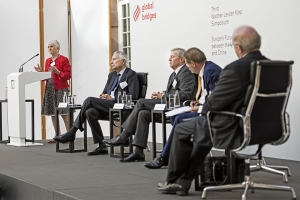 Should China be allowed to buy up Western companies, particularly those with high and unique technological skills and innovative potential? Will the fruits of technological innovation be grown in Europe, but harvested in China? The asymmetry between the EU and China in relation to investments and management takeovers becomes more evident and more problematic. After all, technological knowhow and innovative skills are the most prominent and profitable national capital from which to generate growth and welfare.
Should China be allowed to buy up Western companies, particularly those with high and unique technological skills and innovative potential? Will the fruits of technological innovation be grown in Europe, but harvested in China? The asymmetry between the EU and China in relation to investments and management takeovers becomes more evident and more problematic. After all, technological knowhow and innovative skills are the most prominent and profitable national capital from which to generate growth and welfare.
Klaus Naumann
We were reminded of the airlift 70 years ago, of the seventieth anniversary of NATO next year, and of the uncertainty hovering over the NATO summit next month. Trump could wreck it in a similar way in which he wrecked the G7-Summit. The agreed goal of military spending at 2% of GDP is far from being 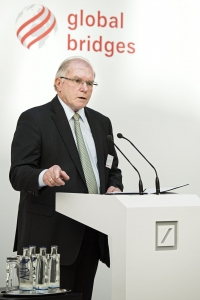 met. Here, quick and profound redress is urgently needed. NATO could face a train wreck, a threat to its very foundations, the most dangerous moment in its existence. Would a Trumpian USA risk the destruction of Boston in order to save Frankfurt? The main beneficiary of the present weakness of NATO is Russia.
met. Here, quick and profound redress is urgently needed. NATO could face a train wreck, a threat to its very foundations, the most dangerous moment in its existence. Would a Trumpian USA risk the destruction of Boston in order to save Frankfurt? The main beneficiary of the present weakness of NATO is Russia.
Trump got the Europeans to face up to their financial obligations, to increase defence spending and to modernise their military capabilities. Which capabilities do we need? We have to deter Russia again, but at the same time we have to seek a viable understanding with Russia. We need new initiatives in arms control, arms reduction, and confidence building. Nevertheless, distrust is growing. Neither side of the alliance can succeed without the other. Europe cannot secure its vital interests without the USA and vice versa. The USA cannot afford to stand alone. The USA must control the opposite coastlines of both oceans if it wants to remain a global power.
The recent initiative of the EU to create PESCO (Permanent Structured Cooperation)-structures and to create coalitions of the willing and the able may point to the way ahead.
Jürgen Fitschen
Beware of simplistic readings of statistics! They correlate two dimensions. Reality has more dimensions. A foreign trade deficit has to be seen in conjunction with financial returns on foreign investments. US corporate earnings from overseas investments are remarkable. If you take all aspects together, the USA has not done badly from present trade arrangements despite the deficits.
We were reminded that Trump has only two pet subjects on which he keeps harping: immigrants and trade deficits. Trump desperately wants to win (and others to lose). He does not understand economics, he does not understand win-win situations.

We have witnessed the first adverse effects of his impulsive policy. By slapping prohibitive tariffs on steel and aluminium, he has hit strategic industries in the USA. Harley Davidson not only has to pay more for imported steel, it also has problems selling bikes in Europe since the EU retaliated with tariffs on their products. They either have to raise prices (and lose customers) or keep prices (and lose profits). Trump’s trade wars will not produce the results he hopes for. Can he be stopped? China has announced its intention of hitting back hard. So far, China seems to emerge as the main winner in this contest. Did Europe pass a chance when Trump offered to scrap all tariffs on automotives? Might a combination of agreeing to that proposal and offering resistance on other fields have an effect on him?
Digitalisation entails bigger and more radical threats than globalisation. Present forecasts predict that 40% to 60% of present professional activity performed by humans could disappear. That means retraining, new job opportunities for those affected, and life-long learning. There will be less and less room for a life-long guarantee in a particular job. People will have to be flexible enough to readapt to new challenges.
There was an agreement that bilateralisation of trade relations between European nations and the USA would be disastrous.
Discussion
The divisions in the Western world are greater than ever before. How can we reconcile internal divisions with resolute and effective action against new risks and threats? Cyber security is one of them.
Workers are in many ways a conservative force. They want to retain the status quo, keep their jobs, have no worries about income security, and wants to avoid having to face new tasks. They love the can-do-confidence Trump exudes, yet they do not see through the threadbare lies and hollow promises he makes. But if things go wrong, they tend to blame others rather than the President.
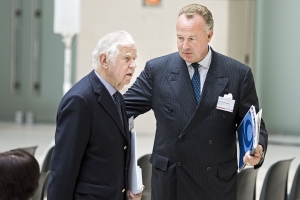 If the EU is to act more coherently and more effectively, it needs leadership. Germany has proven to be a reluctant leader so far. Germany will have to become more assertive, show more initiative, provide ideas and ideals. With Great Britain leaving the EU, the German-French couple will regain its essential function in paving the way ahead.
If the EU is to act more coherently and more effectively, it needs leadership. Germany has proven to be a reluctant leader so far. Germany will have to become more assertive, show more initiative, provide ideas and ideals. With Great Britain leaving the EU, the German-French couple will regain its essential function in paving the way ahead.
Several speakers called for more European unity. Europe must get its act together, must stand united. There is a shift in the center of gravity in Brussels from the Council to Commission and Parliament.
Two remarks:
1) Let us stop pretending that the EU is Europe and Europe the EU. With three, soon to be four, European nations that have explicitly rejected membership in the EU (Switzerland, Norway, Iceland, Great Britain), the EU can no longer claim to stand for the whole of Europe. The EU is fragmenting and is far away from exercising central sovereignty. There will be no further enlargement for the foreseeable future.
2) Each call for more Europe makes the real differences all the more painfully evident. You cannot paper over fundamentally divergent interests by conjuring up some benign spirit of compromise of unity. The more vital the interests involved, the more difficult it will be to arrive at collective solutions. Where is the EU strategy vis-a-vis China? Who is responsible for drafting it? Who carries it out? There is no answer.
Russia is meddling in communications, feeding fake news, inciting comments, obscuring facts, and peddling alternative versions of what all responsible experts agree on. Russian trolls and bot-nets are active and increasingly interfering in internet based communication. Trump loves to show he is in command and can solve the most complicated problems by sheer force of genius. Trump wants a picture with Putin: The two most powerful men solve the world’s problems!
Germany should seek to keep cooperation with Russia open. Russia is not as stable as it may look at the moment. Demography, environment, and health all entail considerable risks. Russia must not lose her stability!
Trump hates and despises the EU. There is still no US ambassador to the EU. Shortly before leaving office, Tillerson gave a survey of US foreign policy. He did not even mention the EU.
Second Session
China’s “Global Mission” after the 19th Party Congress
Volker Stanzel
China has made breathtaking progress since Deng Xiaoping. The three principles of this recovery were (1) undisputed political control of the party (Tian An Men 1989) (2) social reconstruction after the Cultural Revolution, emphasis on education instead of ideological indoctrination (3) an open economy and market principles in conjunction with communism as the official state ideology.
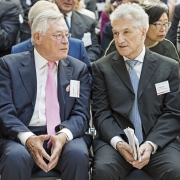 In order to achieve this remarkable growth, China has bought (and obtained in other ways) technology and engineering competences. China has started one of the most impressive and massive education programmes in the world. At the same time, China is restricting the operating room of foreign companies on its territory. There are no level playing fields. The EU and Germany are therefore rightfully considering measures that will introduce reciprocity. Whether they will be symmetrical or asymmetrical and how they will be applied is still open. If the most populous country in the world becomes the foremost economy, this will inevitably have global repercussions.
In order to achieve this remarkable growth, China has bought (and obtained in other ways) technology and engineering competences. China has started one of the most impressive and massive education programmes in the world. At the same time, China is restricting the operating room of foreign companies on its territory. There are no level playing fields. The EU and Germany are therefore rightfully considering measures that will introduce reciprocity. Whether they will be symmetrical or asymmetrical and how they will be applied is still open. If the most populous country in the world becomes the foremost economy, this will inevitably have global repercussions.
China is bound to be a global actor. Whatever it does will affect the fabric of the world. This may cause friction, but should not upset traditional relations. So far, we all are profiting from the rise of China. We should all have an interest that this continues in a stable, foreseeable way.
National success like the one attained by China affects the mentality, the self-awareness, and the pride of people. About half of China’s population has no direct memories of Mao Zedong and the chaos of the Cultural Revolution. For them, China is an uninterrupted story of rapturous success. Do not expect China to become a liberal democracy with a plurality of parties and a legitimate opposition! China’s constitution defines it as a dictatorship. The party’s control over the population is rapidly increasing and will be more pervasive in future. We should not take stability in China for granted. It has an intimidating tradition of chaos, rebellion and revolution: Taiping, Boxers, warlords, civil war, Cultural Revolution.
China is projecting its economic and financial power very carefully according to a long-term strategic plan. The Belt and Road initiative, the gradual militarisation of the South China Sea, the present political movement on the Korean peninsula are carefully orchestrated in Beijing. The Belt and Road initiative has the potential of changing the entire WTO (Joe Kaeser). 68% of German enterprises operating in China do not expect significant advantages from the initiative.
The Chinese model is closely monitored and followed by many other emerging economies. China sets an example that will be imitated and win acceptance. That could change some of the existing international order. We should not be afraid of that, but rather try to influence this trend, e.g. by joining the Asia Infrastructure Investment Bank.
China‘s Future in the Global Competition
Theo Sommer
China has gained its place in the sun. It wants to be and it will be a dominant global power. World leadership is the official goal for 2048, the 100th anniversary of Mao’s victory and his famous exclamation that China is rising from its knees again. The speed and the uninterrupted chain of successes is unique. Against all odds China has completed the most remarkable recovery in history: within little more than one generation, it increased GDP 40-fold, raised per capita income to well over $ 8,000, brought more than 700 million people out of poverty and misery. China’s share in world trade used to be 1%, today it is close to 30%. Urbanisation has increased from 18% to 58% with its target set for 75%. Precondition for this was and remains consolidation of authority in domestic affairs. Within the next decade, China is bound to overtake the USA as the world’s largest economy (only in aggregate terms; in per capita income it will lag behind for a long time).position.
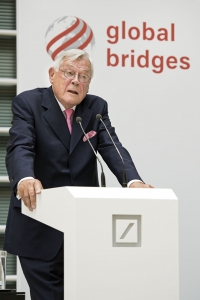
The government has set ambitious targets for 2025 in artificial intelligence, computing, agricultural machinery, space, aircraft, automotive (particularly electric), high-speed railways. In some of these fields, China has good chances of gaining a dominant position.
China wants to be number one in global affairs – economically, politically, an influencer, breaking new ground. From a rule taker it wants to become a rule maker.
Xi Jinping wants to turn China into a solid middle class based society. National success changes mentality, self-awareness, and ambitions of the population. China not only has 1.3 billion people: it has more than 3 billion USD in financial assets. The Eurozone has debts of about the same order. That in itself explains a lot. Is Europe taking the wrong turn this time in a similar way as China did some 300 years ago?
By challenging established rules, China sets a precedent for other emerging economies. China is rapidly building up its armed forces. This may be a reaction to the wars of the West in Yugoslavia, Kosovo, Afghanistan, Iraq and Libya. China has turned its military gaze away from the land and the army and directed it towards the sea and the navy (two aircraft carriers). Some US think tanks predict a war with China. Others regard a military conflict with Iran as more likely. China has not had a peaceful past. It engaged in (short!) wars with India, Russia and Vietnam. The border with India is still disputed and gives rise to tensions. China is militarising the South China Sea. Graham Allison regards China as the main competitor. His latest book on the relationship between China and the USA bears the title: “Destined for War” (without a question mark!). Today, China has the second largest defence budget (about 150 billion USD). That is only a quarter of the money the Pentagon spends, but extrapolating current trends, China might easily catch up by 2030.
This build-up of Chinese forces has triggered responses by its neighbours. Japan has revised its constitution, has started procuring modern defence equipment on a large scale, and intensified military cooperation with Australia, India and the USA.
The Belt and Road initiative can also be seen as a convenient conduit for excess steel and cement from Chinese factories, providing employment for thousands of Chinese workers, a profitable investment at a time when interest on bonds is
near zero. China uses financial dependence skillfully to obtain political leverage and allegiance in questions that are vital for its politics: Taiwan, Tibet, South China Sea, human rights. This is evident in countries where China has massively invested (Africa, South America, the Balkans).
We should not indulge in illusions or wishful thinking. China will not become a democracy in the liberal tradition. The party will not give up control. China is a category by itself: “Too big to be ignored, too repressive to be embraced, too proud to be influenced”. (Madeleine Albright). Maybe we should look at Chinese societies outside China (Singapore, Taiwan, China Towns) and watch how they interact!
In the end, China will by and large behave like all traditional great powers. (Was that meant to reassure or to scare us?).
Panel Discussion
CUI Hongjian
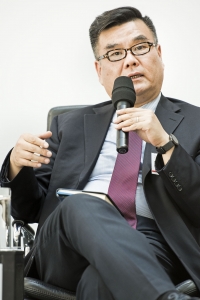 China will be and remain for a long time Germany’s and Europe’s most important trading partner. China seeks stability, continuity, and calculability. China avoids risks, it does not want confrontation. For China, sustainability is more important than speed.
China will be and remain for a long time Germany’s and Europe’s most important trading partner. China seeks stability, continuity, and calculability. China avoids risks, it does not want confrontation. For China, sustainability is more important than speed.
Above all, China has to respect social justice and coherence. The fight against corruption is central to all future development. China is a multicultural society. China seeks reliable, long-term partnerships. It needs them for her own development and its own stability.
China has been encircled in the past. It has known invasions, interference, and occupation. It seeks immunity against all offensive or invasive threats.
Frank Klaas
Geely is now producing profitably and successfully the iconic black cabs for the London taxi transport after several attempts by other managements failed. It runs the Coventry factory of the London Electric Vehicle Company (LEVC). The new taxis run on electricity, thereby substantially contributing to an improvement of London air. Each cab driver can expect to save around £ 100 per week in fuel costs.
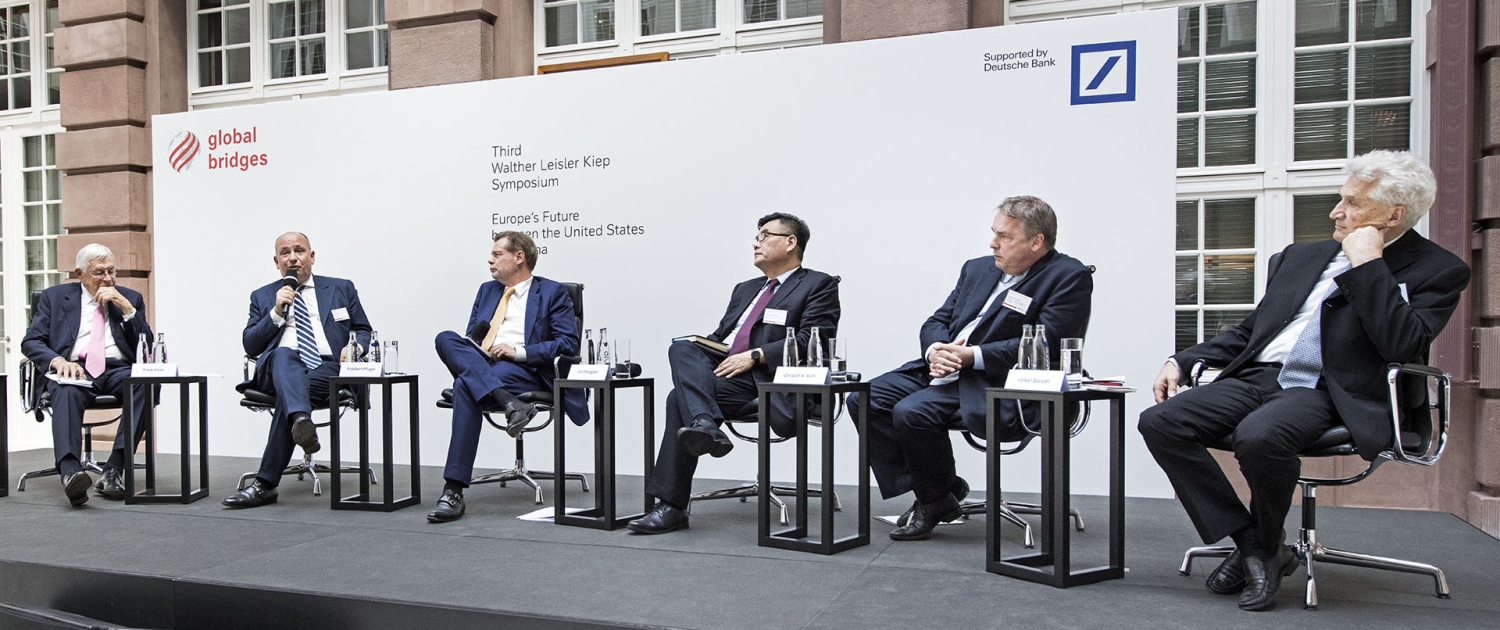
General Motors tried to conquer this market but failed. Many other cities are watching this experiment and are considering adopting this technology. For cities like Hamburg or Stuttgart, which experiment with questionable bans on diesel cars, this could be the ideal solution. The other resounding success is Volvo, taken over by Geely in 2010. It has made a spectacular recovery after both the original Swedish management and then Ford proved incapable of finding a profitable, future-oriented development plan. Volvo in Göteborg flourishes with thousands of new jobs created – and SAAB in Trollhättan withered away! Chinese managers have to operate under circumstances that are totally different from China: culture, language, rules and regulations, patterns of communication, industrial relations. The Chinese approached these challenges very carefully and respectfully. Only once they fully understood the nature of these challenges did they act decisively. Today, Volvo is one of the most successful and profitable companies in Europe.
The city of Hangzhou has rigidly banned scooters with combustion engines. They are all electric now. Shortly afterwards they changed all local buses to electric engines. All this was done within six months. Compared to decision-making processes in Germany, this seems impressive.
Christof H. Rühl
The transition from agriculture to industry may be easier under centralised control and leadership. It is quite different during the transition to a services based economy where decentralisation is essential. Whereas industry exploits economies of scale (mass production of standard goods), services tend to betailor made, meeting each individual client’s personal demand profile. China’s urbanisation marks the tr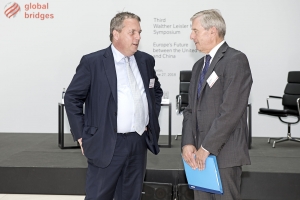 ansition from industry to a service based economy.
ansition from industry to a service based economy.
As China moves towards services, it might have to relax central control.
A similar dilemma is presented by improving the status of the Yuan as a currency for international transactions, maybe eventually as a reserve currency. That status conveys enormous benefits as it allows the country with a reserve currency to incur practically unlimited debt. The acceptability of a currency depends primarily on its free convertibility. For the time being, neither government nor party seem prepared to give up tight control of the money supply and agree to unlimited convertibility.
Discussion
Decentralisation has conveyed indisputable advantages for rapid development. Decentralisation is an ambiguous concept. The EU at present is massively centralising. Would decentralisation mean that European nations are taking back control? The Chinese model resembles more a directorship than a dictatorship; it provides strong central guidance rather than rigid central planning. Demographically, India is bound to overtake China in the next decade. But in economic development and innovation, India is lagging behind.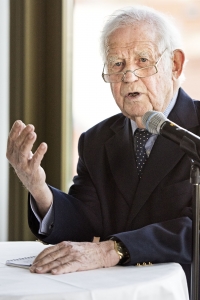
China will not be USA 2.0! China has a clear concept of her own future. Superpower of lifestyle! Fashion and perfumes, accessories and jewellery made in China?
Nobody has an interest in stopping or derailing China’s modernisation. What might be irritating is China’s relentless buildup of military capabilities.
On the other hand, China’s nuclear potential is still only a fraction of the nuclear superpowers. We have to learn to be partners and competitors at the same time. The concept of “compartmentalized cooperation” has been coined for this arrangement.
We have shared interests. Climate change, intelligent energy solutions, demography, and migration potentials cannot be tackled if we do not find a common approach.
Third Session
Europe’s Future between the United States and China
Mark Leonard
The US is undermining traditional rules and common understanding that have given orientation and direction to world affairs. Trump is destroying the multilateral, cooperative system that has governed the Western world since 1945 and has given guidance to the entire world after 1990. 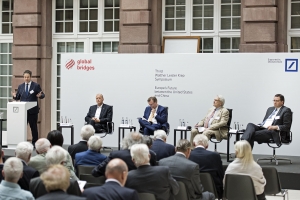
China is investing massively in the USA and other Western countries. This gives urgency to the question of reciprocity and the old problem of intellectual property. China has been copying industrial designs. By purchasing entire Western companies it implicitly acquires legitimate access to some of the most advanced Western technology.
What sort of EU do we want? Does a changing international environment require a new profile, a new identity of the EU? If so, what will have to change?
Is the EU finding itself between an American rock and a Chinese hard place? The EU has to find transactional leeway, i.e. room for equitable give and take. Is it sufficient for the EU to keep out of trouble and stay neutral?
Thomas Enders
There is no prospect for any further EU-enlargement in the foreseeable future. The EU is fully absorbed in sorting out current problems of the Eurozone, migration, and the consequences of Brexit, which may be more complicated, painful, and lasting than the simple questions of institutions and future trade arrangements. The psychological fallout on both sides may be dangerous, for both sides will tend to shift blame onto the other side if things go wrong – as they certainly will.
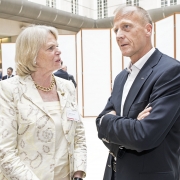 The EU is frittering away resources on agriculture and transfers. China is investing 100 billion USD annually on artificial intelligence and computing. That is more than the rest of the world taken together. China is seeking a foremost position in space, aircraft, automotives (particularly electric cars), security and defence. China follows a comprehensive approach to security, including finances, environment. For the West, the message is clear: secure your borders, secure your finances, secure your currencies, secure your supply lines!
The EU is frittering away resources on agriculture and transfers. China is investing 100 billion USD annually on artificial intelligence and computing. That is more than the rest of the world taken together. China is seeking a foremost position in space, aircraft, automotives (particularly electric cars), security and defence. China follows a comprehensive approach to security, including finances, environment. For the West, the message is clear: secure your borders, secure your finances, secure your currencies, secure your supply lines!
Josef Joffe
Trump is destroying the multilateral, cooperative system that has guided unprecedented growth in the Western world after World War II. His idea of trade wars is simplistic, dangerous, and potentially disastrous. Resistance must come from within the USA, for the American economy will be as badly hurt as everyone else.
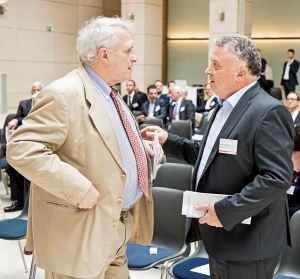 The migration crisis threatens the very foundations on which the EU was built: consensus of the people. At the moment, the EU-member states are not moving forward to an “ever closer union of the peoples of Europe” (Art. 1, Treaty of Lisbon), but in the opposite direction, away from each other. The EU has to stave off this new type of invasion or it will fail. The EU is not a truly global player. The US is at present the only nation with global interests, global presence, and global reach. China may move into that category within a decade or two.
The migration crisis threatens the very foundations on which the EU was built: consensus of the people. At the moment, the EU-member states are not moving forward to an “ever closer union of the peoples of Europe” (Art. 1, Treaty of Lisbon), but in the opposite direction, away from each other. The EU has to stave off this new type of invasion or it will fail. The EU is not a truly global player. The US is at present the only nation with global interests, global presence, and global reach. China may move into that category within a decade or two.
The EU’s primary impulse is to keep out of trouble and to stay neutral, avoid confrontation or open conflict at all costs. Despite all institutional creativity and solemn promises, the EU is not equipped to project power and push its interests in the face of stubborn opposition. It is strong in soft power and weak in hard power.
Andreas Ritzenhoff
Foreign investors can face an excruciating series of obstruction, discrimination and unfair treatment. Chinese authorities can easily reinterpret treaty commitments and change their attitudes. China joined the WTO, but it is observing WTO-rules only pro forma and keeps ignoring them in practical operations whenever it appears advantageous.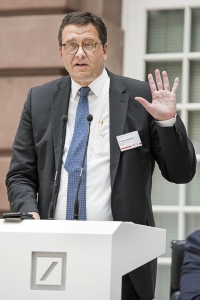
China seems to be constantly breaking the very rules it is officially committed to. Particularly in the future market of light products, China has flooded the global market with highly subsidised products. China has recognised that light will be the chief medium for the transport of information at much lower costs and higher density than traditional technologies. It pursues a policy of conquering global markets in order to establish its own industries in a dominant position – very much like Japan did in the 60s: sell cheaply, destroy all serious competitors, and then reap quasi monopolistic returns.
Chinese firms in strategically important sectors receive guidance, support and cheap credits from the government. The acquisition of foreign firms in technologically relevant sectors is part of this official strategy of conquest in global markets. China needs much more knowledge and resources than its own territory provides if it wants to raise the living standards of its huge population to European or North American levels. It seeks to export its own finished goods and obtain access to knowledge and resources in other parts of the world. It is in some ways a mercantilist model.
